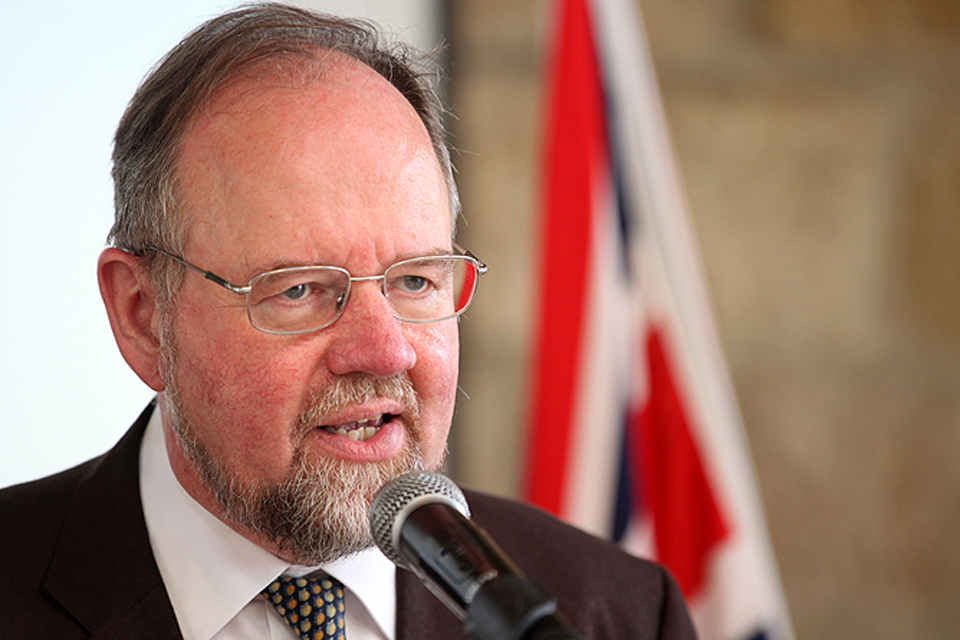British Consulate celebrates World Press Freedom Day
Sir Vincent Fean, British Consulate General delivers a speech during a reception in Ramallah to celebrate the World Press Freedom Day.

The British Consulate General in Jerusalem hosted a reception in Ramallah to celebrate the World Press Freedom Day. The deputy of the Ministry of Information Dr. Mahmoud Khalifa, Palestinian government’s spokesperson Mrs. Nour Odeh, and the head of the Palestinian journalist syndicate Mr. Abldenasser Annajar attended the ceremony, as well as many other prominent journalists and media officials.
In his speech, BCG Sir Vincent Fean stated:
Our Human Rights Philosophy
- Britain seeks to uphold democratic freedom, universal human rights and the rule of law. During this period of immense global change, The UK firmly believes that we and our partners need to stay true to these values. That is why we have come together today to support democracy, freedom and peace around the world.
- British Foreign Minister William Hague, has said – “Human rights are essential to and indivisible from our foreign policy objectives. There are compelling reasons for this approach. It is not in our character as a nation to have a foreign policy without a conscience, and neither is it in our interests: Our prosperity is linked to that of others. We cannot achieve long term security and prosperity unless we uphold our values. Where human rights abuses go unchecked our security suffers.
Importance of Freedom of Expression
Freedom of expression is an essential element of democracy and human rights. It is fundamental to the democratic process, to good governance and to exposing corruption and human rights violations. Protecting freedom of expression and the free flow of information and ideas, both online and offline, are “cornerstones of a stable and prosperous society.
What is the UK doing about freedom of expression?
- We continue our work bilaterally and in the UN to prevent the erosion of existing obligations on freedom of expression. A, for as we are concerned the right to freedom of expression applies online in the same way as it does offline.
- We also believe firmly in safeguarding the freedom of journalists to work and express their views freely.
- Freedom of expression and the free flow of information, ideas and knowledge are essential for development in the digital age.
- As British Foreign Minister William Hague, has said: “in the United Kingdom we aspire to a future cyberspace that is characterized by openness and transparency. A future where safe, trusted and reliable access to the internet is the norm irrespective of where you are born, in which we are able to harness the power of new technologies to close the digital divide, to spur growth and innovation, to protect cultural diversity and to increase accountability and transparency. A future where the flow of business and ideas drives down barriers to trade and increases choice for citizens. A future where human rights are respected online as well as offline.
- Following the Arab Spring, we see growing numbers of people in North Africa and elsewhere ending up in jail for blogging and tweeting about issues here we would consider to be legitimate political debate and freedom of expression. We believe that efforts to suppress the internet are wrong and are bound to fail over time. Governments who attempt this are erecting barricades against an unstoppable tide, and acting against their own long term economic interests and their security. This debate needs to be part of international efforts to protect the future of cyberspace.
Our freedom of expression concerns
- We believe in the right to peaceful protest, without stone-throwing and without disproportionate response by force controlling public order.
- We remain concerned about IDF policing of demonstrations in the West Bank, which often involves the use of tear gas and rubber-coated bullets.
- In July 2012, Palestinian police used excessive force to disperse a small demonstration near the Presidential Palace. President Abbas condemned the way the protest had been handled. We have since noted improvements in how the Palestinian police have dealt with demonstrations.
- We are also deeply concerned about internal repression in Gaza under de facto Hamas rule, including the closing down of the annual Palestinian Festival of Literature by Hamas security forces.
- Project – to help civil society address the issue of accountability, earlier this month DFID Minister Alan Duncan launched The Supporting Stability and Promoting Democracy Programme, through which Young Palestinians will be given the tools they need to hold their leaders to account and play an active role in creating a prosperous and stable future for themselves and the whole of the Middle East.
So we are here today to celebrate together World Press Freedom Day, to express our solidarity with the Palestinian media community in East Jerusalem, the West Bank and Gaza, and to reaffirm our commitment to press freedom ere, in Gaza, in the UK and around the world.